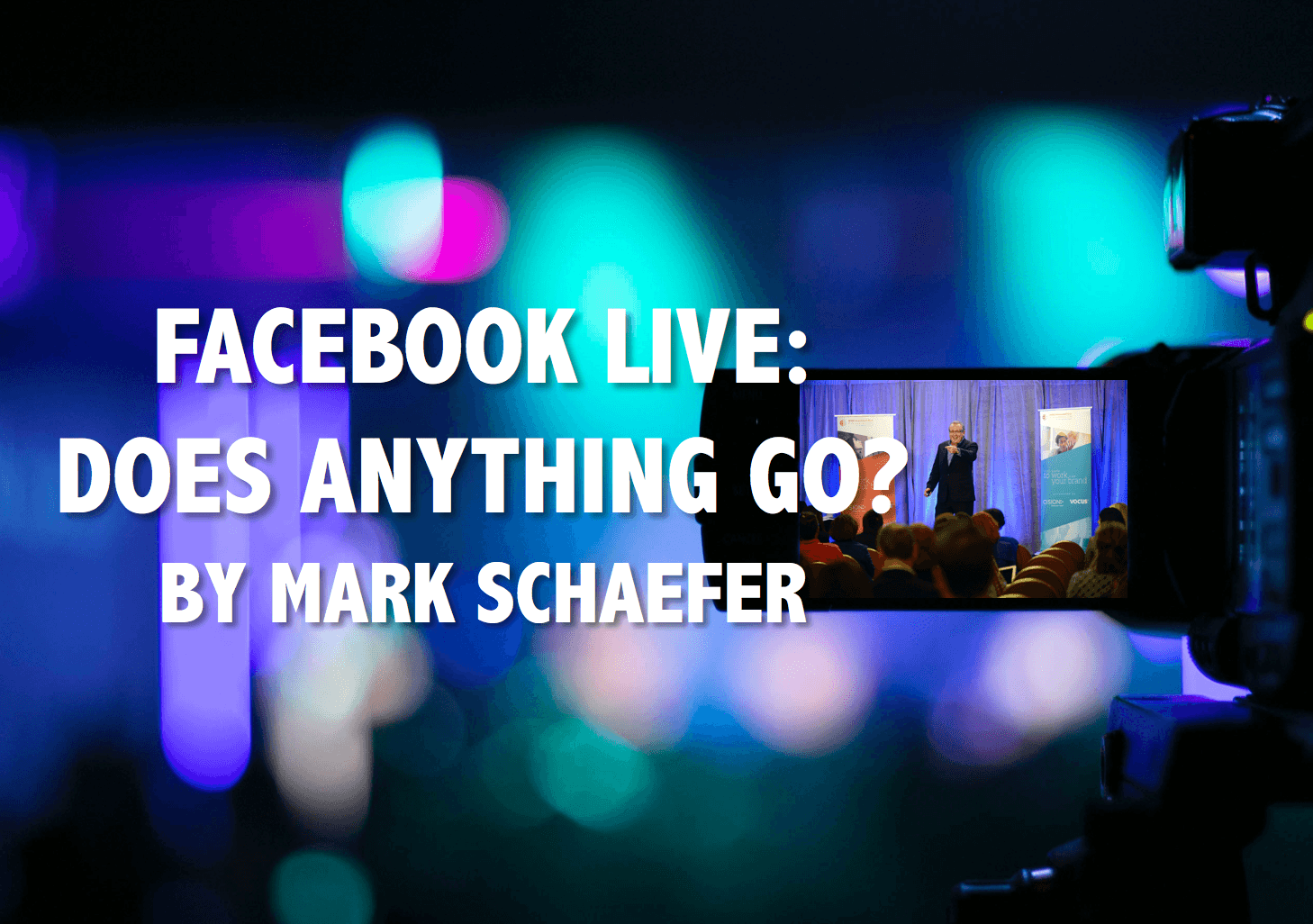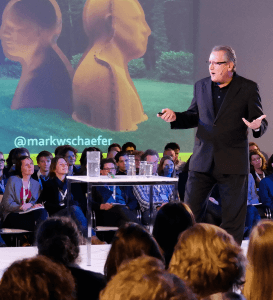
By Mark Schaefer
Last week I donated my time and talents to provide social media advice to a local community group. It wasn’t a prepared talk. In fact, I was a bit out of my element discussing minority business leadership issues … which was OK because it’s a subject I’m passionate about.
But it was a group of about a dozen people having a private and honest conversation and I was somewhat unnerved to see a woman holding her phone up for an extended period of time. Was she recording me?
I concentrated on the discussion and frankly forgot about the incident since I had to leave right after the meeting to run to a speaking engagement.
However, when I saw her video post on Facebook, I realized she was live-streaming my off-the-cuff comments in a private meeting.
Was this a violation of my privacy, or simply business as usual in this digital age? Am I in the category of a public figure who should expect this sort of thing, or am I just a guy with a blog who was helping some friends?
Was this recording actually a benefit to me?
Is Facebook Live broadcasting a “right?”
I posted about this experience on Facebook and received nearly 200 comments from lawyers, the head of social media for a Fortune 100 company, agency leaders, educators, professional speakers, the former head of PR for Ford Motor Company, and many others.
Their commentary and insight was keen, and in some cases profound, so I decided to share it here with you (with their permission).
Although 90 percent of the comments said this activity was out of line and that the woman should have asked permission, there was a range of diverse views which I tried to capture here. I edited some of these highlights for grammar, style, and length.
Lindsay Bell-Wheeler This is not cool AT ALL. You should feel violated, in my opinion. A breach of trust.
Julia Bramble Live streaming is the equivalent of filming. Would she have felt entitled to film the whole thing? I doubt it! But somehow ‘Live-ing’ is excusable. Well – it’s not! When you go to the theater you’re not allowed to take photos, let alone video. Theaters are protecting their IP, preventing low-quality versions of their work from getting out there and controlling the context in which their work is viewed. I see no reason why your work shouldn’t be protected in a similar way.
Scott Monty It’s common courtesy to ask. But in this day and age, it’s helpful for you as a presenter to remind the audience what is and isn’t acceptable. If you don’t feel comfortable with live video, you have every right to state that before you begin your session.
Matt Hannaford Here’s my line…did she pay to be there or was it free for anyone to come to? If it was free…I think broadcasting is probably ok. If she paid, then it was giving away something that others are paying for.
Margie Analise Do people think that because it’s available it’s ok to livestream without asking? Wrong, wrong wrong on EVERY level. But since we know they’re out there with that mentality, I’d say we have to be proactive and preface our conversations and meetings with “do not live stream this.”
Jennifer Humke Ballard We deal with this every year at our conference. In addition to the copyright issues and just being plain rude, live streaming the content from a paid event is unfair to the people who paid to attend. It also hurts our sales of both physical tickets and the recordings that we sell to people who couldn’t attend. Those paid events fund all the free content we provide throughout the year… Live broadcasts of reactions or comments or interviews or other fun stuff from an event is great, but the content itself–nooooooooo!
Hope Brookins When it comes to personalities, especially people at the Gary Vee level, there is little that can ultimately be done to prevent live-streaming. I think it makes the most sense to leverage it.
Doug Kessler Feels like there’s a fuzzy line between being KNOWN and being a celebrity. You experienced what celebrities experience every day.Their lives are no longer their own.
Dr. Laura Lucas People livestream concerts – remember there was all the fear it’d be the death of the music industry? Congrats! You’re a rockstar! I’d say unless you specifically ask not to be filmed I’d just do it. I’m sure folks live-streamed you from your CMA speech when I was there…
Jeff Fryer Did you say anything about it at the beginning? No? Then it looks like both the teacher (you) and the student (the person) have some teachable moments, and assumed something differently than what happened. It’s starting to become the norm. You’re fighting against the tide.
Elizabeth Anne Hamilton You need to specify beforehand, otherwise it’s considered fair game, polite or not.
Evin B. O’k For large event talks or keynotes, video sharing seems common and socially acceptable. But for a workshop setting, it seems inappropriate … like sharing photos of cookbook pages online. This is your wisdom to share, not theirs.
Doyle Buehler I would encourage the video. You can’t fight it so don’t fear it. Next we’ll all be part of the wave of AR/VR. If you’re appearing in public in front of others then you are public.
Jeff Jockisch I’ve been studying privacy for years. I now work for a data privacy company. If you are doing something in a public setting as a “public figure,” which I think you could be classified, you should have no expectation of privacy. I’m not really sure any of us should have an expectation of privacy anymore.
Isaac Pigott When I present, I’m speaking with and engaging with the audience that is present. That’s very different than what I did in television news. If you try to live stream what I am intending for a personal audience, you a doing a disservice to the people on the stream, and you are doing a disservice to me. The things I say to a captive in-person audience are within a context. The pieces recorded or captured out of that context are quite frankly dangerous.
Anne-Maria Yritys Under copyright law here in Finland you are allowed to film at public events, but publishing it would be illegal without a permission to do so.
Andy Brown What if someone finds out they are clearly visible in a Facebook live video taken by someone filming people attending a conference and would rather this wasn’t online. Should the person filming get a signed release form from everyone! Where and how does the law cover the new technology we have at our fingertips? I would love to know the legal rights across the board for everyone attending and speaking at a conference.
Pam Moore I think being “in a live video” someone else is filming just by being in the same location is different from delivering proprietary information for a small group and winding up with it being blasted to the world. I’m considering adding a short slide that includes expectations if I am in fact sharing content I do not want blasted live.
Jeff Korhan This is the world we live in. I wouldn’t be happy about it but I think we have to expect it. I’m not worried about anyone stealing my ideas.
J.S. Gilbert I think we’ve become a society that prefers to ask for forgiveness rather than permission.
Chad Parizman I attend a monthly meet up meant to be off the record. We noticed someone broadcasting on Telescope right after its launch. Since then the host makes sure to ask everyone not to record anything in order to allow everyone to speak freely. It helps loosen up the discussion when no one has to worry.
Rosie Maria Cafarelli That woman just made your audience bigger. I hope everyone in my audience streams me on their FB.
Dr. Julie Albright Students are recording professors in classrooms – it has happened at USC, then posting to Youtube, for example. You are naive to expect it is not going to happen. Plan for it. Don’t say anything you wouldn’t want broadcast. Whether it’s “wrong” or not is beside the point. It happens. Prepare yourself.
Caleb Storkey I think the horse has bolted on this one. Unless explicitly stated, people consider it fair game to broadcast presentations, Q&A’s and content being delivered; the focus isn’t on how the presenter feels about it.
What happened, and what I learned
When this woman at the meeting learned that I was unnerved by the recording, she took the video down and apologized. The sponsor of the event had asked her to broadcast it and she was just following his request.
My own reaction was probably over-blown. I was just startled that it had happened and it made me reflect on what I had said to this group that was now in public. I feel a bit sheepish about taking down a video that probably would have been interesting to others in my community.
I learned a lot from the comments from my social media friends. My main take-aways:
- Don’t be startled by live-streaming. Expect it.
- If live streaming is inappropriate for a situation, be explicit about forbidding it (although there are no guarantees).
- Accept the fact that some people see me as a “celebrity” — a condition they define, not me — and that my presence may be more likely to appear on the web.
- Never forget that my comments are being recorded (especially in a large venue)
Did this content get you thinking about the topic? What would you add?
 Mark Schaefer is the chief blogger for this site, executive director of Schaefer Marketing Solutions, and the author of several best-selling digital marketing books. He is an acclaimed keynote speaker, college educator, and business consultant. The Marketing Companion podcast is among the top business podcasts in the world. Contact Mark to have him speak to your company event or conference soon.
Mark Schaefer is the chief blogger for this site, executive director of Schaefer Marketing Solutions, and the author of several best-selling digital marketing books. He is an acclaimed keynote speaker, college educator, and business consultant. The Marketing Companion podcast is among the top business podcasts in the world. Contact Mark to have him speak to your company event or conference soon.
Illustration courtesy Unsplash.com


